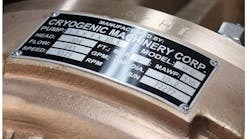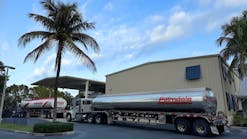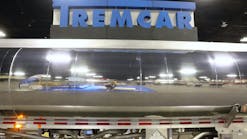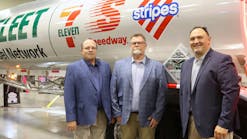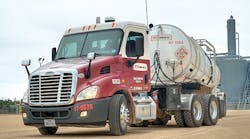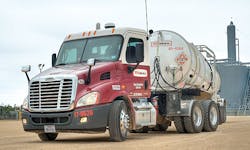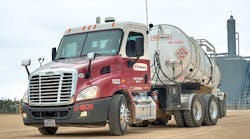Trimac Oilfield Services finding great opportunities in the shale plays
LESS THAN two years after it was formed, Trimac Transportation's Oilfield Services product line accounts for 10% of the tank truck carrier's US total revenue. By all indications, the oilfield product line will continue to be a strong contributor to the bottom line in 2013 and beyond.
Trimac's oilfield hauling operations are heaviest in the Niobrara (Colorado and Wyoming) and Eagle Ford (South Texas) shale plays. To a lesser extent, the carrier is serving customers in the Bakken (North Dakota), Haynesville (East Texas and northwestern Louisiana) Marcellus, and Utica (northeastern United States) shale formations. Primary cargoes hauled are crude oil, condensate, frack sand, cement, and nitrogen/CO2.
“Our outlook for the oilfield product line is very positive going forward into 2013,” says Adam Borden, Trimac Transportation general manager of Oilfield Services. “The fourth quarter of 2012 was our best quarter to date, and we have favorable long-term agreements in place that mitigate our risk in a volatile market over the next couple of years. Working with long-term strategic partners, we have negotiated significant contracts running through 2016 and beyond. We have projected 15% to 18% growth in 2013.
“We remain very optimistic about the oilfield. We expect our partners to do a lot more drilling and completions in the areas where we serve them. Some market indicators show that drilling activities aren't expected to peak in South Texas until around 2018. Even with the pipeline infrastructure increasing, the demand for trucking won't go away. Pipelines will displace a large percentage of tank transports over time, but some wells will never be linked to the pipelines.
“We've been relatively cautious in building our Oilfield Services product line, but we are growing strategically. Our goal is to make smart investment decisions to meet our customers' transportation needs without over building our fleet and facilities. When we see promising opportunities in the oilfield, we go after them aggressively.”
Oilfield expansion
Trimac Transportation is by no means a newcomer to oilfield hauling. The company actually has a rich oilfield history dating back to the mid-1970s.
Trimac had become a diversified publicly traded company in Canada and expanded into energy services in 1976. Two years later, the company began investing in exploration and development of oil and gas reserves in Canada. By 1980, the oilfield activity had expanded into the United States.
Trimac page 2...
Even as the oilfield business grew, Trimac's tank truck presence spread across North America. Management ultimately decided that they needed a single business focus to achieve the best results and they chose trucking and related logistical services as their core business. As a result, oilfield drilling operations were spun off in 1997.
However, Trimac never completely left the oilfield sector. The fleet and the comp any's US operations continued to handle some transload and trucking operations for oilfield-related shipments in the United States. In an effort to grow the crude oil product segment, Trimac purchased Conoco's private crude oil fleet (in 2003) that was based in Greeley, Colorado.
Shale plays
Greeley happens to be in the midst of one of the major oil and gas shale plays that are driving the current oilfield boom. The community sits above the Denver-Julesburg Basin, a 70,000-square-mile, oval shaped area that encompasses northeastern Colorado, western Nebraska and Kansas, and southeastern Wyoming. In turn, the D-J Basin is part of the Niobrara Shale play.
The D-J Basin is a huge petroleum reservoir with coal, natural gas, and oil captured and spread among various shale, sandstone, and limestone formations going down as deep as 7,000 to 13,000 feet. Serious drilling in the formation began around 1901, but production activity remained slow through most of the 20th century.
Production activity picked up significantly in recent years with the development of horizontal drilling and hydraulic fracturing, the technologies that have enabled exploration and production companies to tap oil and gas reserves in the shale plays where conventional drilling technology was inadequate. Currently, there are approximately 24,000 producing wells in the D-J Basin.
Trimac's oilfield operation in Greeley benefitted greatly from the increased production activity in the D-J Basin and Niobrara shale formation. The Greeley operation has more than 35 truck-and-trailer combinations that range in capacity from 8,400 to 11,500 gallons, inclusive of truck-and-trailer units that hold about 9,200 gallons. Through much of the region, the carrier can run gross combination weights as high as 110,000 pounds. Trimac has more than 80 drivers providing service 24 hours a day, seven days a week gathering crude oil and condensate from multiple leases sites in the area.
“Our ability to haul oil around the clock enables Trimac to provide superior and reliability to our customers on a consistent basis,” says Bill Marchbank, Trimac vice-president of US operations. “We've seen tremendous growth at this location as a result, and we expect this growth to continue into 2013.”
Branch renovation
With oilfield volumes growing rapidly in the D-J Basin, Trimac quickly outgrew its original location and had to find larger quarters. Trimac purchased a new 7.5-acre location in Greeley in March 2011 and launched a major overhaul of the facility that fully opened in April 2012.
Trimac page 3...
The renovation included a complete rebuild of the six-bay shop (which is operating under the National Tank Services brand), offices, and driver facilities. “We turned a former warehouse area into our drivers' lounge, locker rooms, and shower area,” says Borden. “We also added meeting rooms where we conduct our extensive in-house safety training programs, driver orientation, and customer-specific training.”
In late 2012, National Tank Services added an internal tank cleaning rack, according to Travis O'Banion, NTS director of product development. “This facility expands the footprint of commercial cleaning and maintenance services provided by NTS in this very active oilfield market,” he says.
“We are one of the largest crude oil haulers in the area, and we will add tractors, trailers, and drivers as needed to support increased oilfield activity,” Borden says. “We're constantly looking for the best professional, experienced drivers with excellent math, reading, and writing skill sets.”
While the most of the crude oil loads are moved to pipeline and other gathering points within the D-J Basin, some shipments go to other outlets in Wyoming.
In addition to the Greeley oilfield operation, the facility also accommodates a fleet operation that is focused on dry bulk hauling. The dry bulk operation primarily serves the construction industry, along with oilfield dry bulk products like cement and frack sand for oil well service companies.
The growth in the Colorado oilfield business was a big factor in the decision to establish the Oilfield Services product line. “Customers we serve in Colorado convinced us to get more involved in the oilfield,” Borden says. “They have operations in other shale plays, and we have and will continue to expand with them.”
Texas move
From Greeley, the Oilfield Service product line expanded into South Texas. It was a rapid move launched in March 2011. In just 20 days, Trimac established crude oil operations in the Eagle Ford Shale region. Terminal locations were established in Dilley and Catarina. Branch managers share office space at Trimac's main branch in San Antonio.
Trimac has seen exponential growth in this area over the past two years, and now has operations spread out across the Eagle Ford area.
Today, Trimac has more than 70 drivers and 35 tractor and trailer combinations hauling crude oil in South Texas. In addition to housing drivers in the Dilley and Catarina locations, some of the crude oil drivers are based in Corpus Christi and Victoria, Texas.
The easiest part of the process in establishing crude oil operations in South Texas was bringing in managers, drivers, and equipment from current Trimac operations in the United States. The bigger challenge was finding adequate living quarters for the drivers and places to park tractors and trailers and set up maintenance shops.
“To meet our start-up schedule, we pulled in a number of tank trailers and tractors from other parts of the Trimac system,” Borden says. “We converted a number of chemical trailers — both aluminum and stainless steel — to crude oil use with very little effort in order to quickly start the operation. As we grew, we invested in equipment specific to crude oil standards.”
“A customer condition was that we not hire existing drivers in the South Texas market when we set up our operation there,” Borden says. “We had to bring in drivers from outside the market. Some transferred in from other Trimac locations. We had drivers coming from as far away as North Carolina and as far north as Chicago, Illinois, but most of the drivers in the new crude oil operation are from Texas and Louisiana.”
Man camps
Drivers based at the Dilley location are housed in camps set up by Trimac. Trimac has leased all of the rooms in a truck-stop motel, as well as a nearby house for drivers based in Catarina.
Trimac page 4...
“Our oilfield camps from Mobile Mini Inc have regular bedrooms for the drivers,” Borden says. “Each trailer also has a living room with television and satellite set up, a washer and dryer, and a full kitchen where drivers can cook their own meals. One trailer has been partitioned to include office space for Trimac managers in Dilley.”
A portable National Tank Services two-bay maintenance shop is up and running in Dilley, and Trimac is developing another shop at the truck stop in Catarina. Two 40-ft ISO box containers form the sidewalls of the Dilley shop. The containers provide space for parts and tools storage, as well as a small workshop. The shop is covered with a mesh material that protects mechanics from the sun. A concrete pad was poured for the shop floor. Halogen lights illuminate the maintenance bays.
“We wanted portability for our maintenance shop, and we have it with this arrangement,” Borden says. “In a very short amount of time, we can move everything but the concrete floor if the focal point of our South Texas activity changes.
“It is critical to have maintenance capabilities in the field,” Borden says. “Our trucks are operating in tough conditions across an area that spans 400,000 acres. A lot of time is spent on roads that are not paved, and it takes a toll on the equipment. The NTS maintenance team does a great job of keeping our trucks in great operating order, which ultimately adds to our ability to serve our customers in this very demanding market.”
San Antonio operation
Trucks assigned to the dry bulk branch in San Antonio also operate in the oilfield, and they serve an even larger area of South Texas. The branch focuses on dry bulk cargoes (specifically construction and industrial materials) and was established when Trimac acquired Quality Service Tank Lines in 1982.
“We've been hauling oilfield cargoes for many years, and it has been great business for this terminal,” says Borden. “Today, 90% of our hauls are for the oilfield. For at least 13 years we have hauled sand-sized ceramic beads used in fracking, and we added other types of frack sand about three years ago. Some wells take up to 415 loads of sand. We also haul cement for oilfield clients.”
The San Antonio branch has 71 company tractors and 160 dry bulk trailers. It uses a broad mix of company drivers and owner-operators running within a 125-mile radius of San Antonio. Many of the drivers, especially those hauling sand for drilling operations, live in the Eagle Ford shale region.
Trimac also serves oilfield customers through its network of transload facilities in the United States and Canada. Trimac US serves the oilfield with multiple frack sand transload facilities in Texas, and in Canada, BulkPlus Logistics operates two crude oil transload facilities.
“BulkPlus is transloading crude oil hauled by truck from the Bakken Shale Play to their transload facility in Estevan, Saskatchewan,” Borden says. “Another BulkPlus transload facility in Langley, British Columbia handles oil from the Bakken Shale Play as well.”
Equipment diversity
Trimac uses a diverse fleet to handle the oilfield business. Daycab tractors are used for crude oil and some dry bulk. However, the carrier has primarily owner-operators with sleeper tractors handling frack sand and cement loads in South Texas. “Our dry bulk drivers might spend up to a week at a well site,” Borden says.
Company trucks typically are specified with 455-horsepower engines and 18-speed manual transmissions. Trucks ordered specifically for the oilfield have thicker frame rails and heavy-duty suspensions. Tires are specifically designed for the oilfield and are more chip resistant than typical on-highway tires.
Qualcomm satellite tracking and communication units allow drivers the ability to send customers real-time product information on every load of crude oil hauled. All trucks are equipped with centrifuges.
Crude oil tank trailers are double conical and are constructed of aluminum. Capacity ranges from 8,400 gallons to 11,500 gallons. Tank equipment includes Titan Logix overflow systems, Roper pumps, butterfly valves, and pressure-relief vents. All assets and processes in the oilfield follow API standards. Trimac uses air-ride suspensions on its crude oil trailers with upgraded heavy-duty suspensions on older trailers.
Typically, the carrier uses dry bulk trailers with a 1,040-cu-ft capacity for frack sand and cement. Trailer hardware includes BTI tees, check valves, and pressure-relief vents. The newest dry bulkers were specified with roll stability.
Beyond the current equipment used in the Oilfield Services unit, Trimac can pull in varied tank trailers from across its North American operations. “We're looking at opportunities to handle more natural gas liquids in 2013,” Borden says. “We already have the MC331 trailers that we would need, and that could help us become more active in NGL hauling across the multiple shale plays in the United States.”
Borden adds that he fully expects more drilling activity by the exploration and production companies in rich liquid shale plays in 2013. Less than 15% of the field served by Trimac in South Texas has been drilled, so tremendous opportunity is still ahead.
Trimac will continue to work closely with its current customers and pursue the most promising new opportunities. “We're going to grow in the oilfield, but we are going to make smart strategic decisions that benefit us and our customers,” Borden says.





